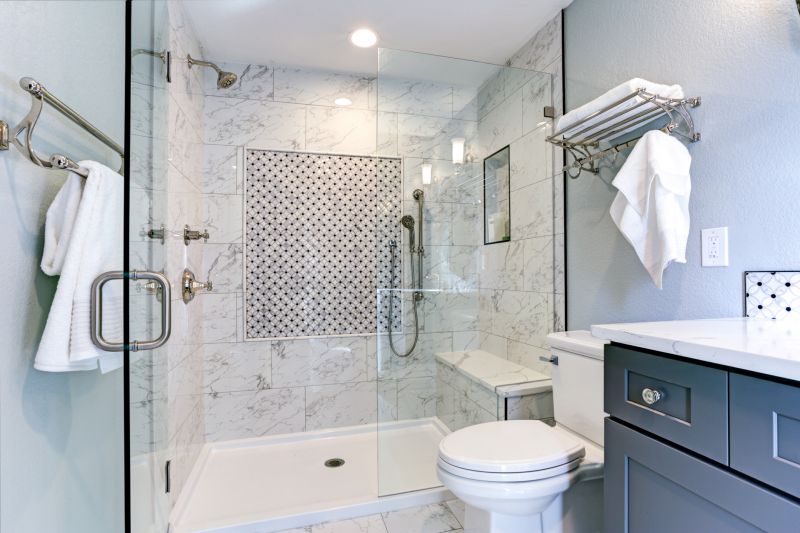Popular Shower Waterproofing Service Products for Reliable Protection
Discover the most sought-after waterproofing solutions that help maintain waterproof integrity and prevent leaks in shower spaces.
 Shower waterproofing products are essential components in maintaining the integrity and longevity of bathroom installations. They serve as a barrier to prevent water seepage into underlying structures, which can cause mold, mildew, and structural damage over time. Selecting the appropriate waterproofing solutions depends on the specific requirements of the shower area, including surface types, installation methods, and durability expectations. Proper application and choosing high-quality materials can significantly enhance the performance of a waterproofing system, ensuring a dry and safe bathroom environment.
Shower waterproofing products are essential components in maintaining the integrity and longevity of bathroom installations. They serve as a barrier to prevent water seepage into underlying structures, which can cause mold, mildew, and structural damage over time. Selecting the appropriate waterproofing solutions depends on the specific requirements of the shower area, including surface types, installation methods, and durability expectations. Proper application and choosing high-quality materials can significantly enhance the performance of a waterproofing system, ensuring a dry and safe bathroom environment.
Top Overall Option
Liquid Waterproofing Membrane
A high-quality liquid waterproofing membrane offers a seamless, flexible coating that adheres well to various surfaces, including tiles, concrete, and drywall. It provides an even barrier that can accommodate slight movements within the structure, reducing the risk of cracks or leaks. Easy to apply with a brush or roller, this type of membrane is suitable for both new installations and renovation projects. Its versatility makes it a popular choice among professionals and DIY enthusiasts alike, ensuring comprehensive coverage in shower areas.
Types of Products For Shower Waterproofing Service
Liquid Waterproofing Membranes
Seamless, flexible coatings that conform to surfaces and provide continuous water resistance.
Sheet Waterproofing Membranes
Pre-formed sheets made of rubber or plastic that are installed over surfaces for durable waterproofing.
Waterproof Tapes
Adhesive tapes designed to seal joints, corners, and seams in shower enclosures.
Sealants and Caulks
Flexible sealants used to fill gaps, joints, and edges to prevent water penetration.
Waterproofing Paints
Specialized paints that create a water-resistant coating on surfaces.
Cementitious Waterproof Coatings
Ready-mixed or dry-mix coatings that form a waterproof barrier on concrete and masonry surfaces.
Bituminous Membranes
Asphalt-based membranes that provide a durable waterproof layer, often used in heavy-duty applications.
Polyurethane Coatings
Flexible coatings suitable for sealing and waterproofing various surfaces in showers.
Epoxy Waterproof Coatings
High-strength coatings ideal for areas requiring additional chemical and water resistance.
Waterproofing Kits
Complete sets that include multiple components for DIY waterproofing projects.
Popular Choices
Widely used for their seamless application and adaptability to complex shapes.
Favored for their durability and straightforward installation process.
Commonly used for sealing joints and edges in shower enclosures.
Popular for their flexibility and strong adhesion in sealing corners and edges.
Often chosen for their ease of application and paintability.
Trusted for their compatibility with concrete and masonry surfaces.
Known for their robustness in demanding waterproofing scenarios.
Popular for their flexibility and adhesion to various surfaces.
Chosen for their chemical resistance and durability in wet areas.
Used for providing a water-resistant layer on surfaces like tiles and concrete.
Popular for DIY projects, offering all-in-one solutions.
The market offers a wide variety of products designed for shower waterproofing, ranging from liquid membranes to sheet membranes, sealants, and waterproof tapes. Each type has its advantages and ideal use cases. For instance, liquid membranes are often favored for their seamless application, providing continuous coverage over complex surfaces. Sheet membranes are valued for their ease of installation and durability, especially in large or irregularly shaped areas. Sealants and tapes are useful for sealing joints, corners, and edges, where water intrusion is most likely.
Proper preparation of the surface before applying waterproofing products is crucial for optimal results. Surfaces should be clean, dry, and free of debris or loose material. Many waterproofing products require multiple coats or layers, and adequate curing time should be observed between applications. Additionally, compatibility with other building materials and adherence to manufacturer instructions are vital considerations. Investing in reliable waterproofing products and following best practices can help prevent costly repairs and maintain the bathroom’s structural integrity for years to come.
Ultimately, choosing the right waterproofing products involves understanding your specific project needs, the type of surface, and the environment in which they will be used. Consulting with professionals or thoroughly researching product specifications can aid in making informed decisions. Properly waterproofed showers not only improve the longevity of bathroom fixtures but also contribute to a healthier indoor environment by reducing moisture-related issues.
Key Buying Considerations
- Compatibility with existing surfaces and materials
- Ease of application based on your skill level
- Type of waterproofing product suitable for your project (liquid, sheet, tape, etc.)
- Durability and flexibility of the product over time
- Coverage area and whether multiple coats are required
- Curing time and drying requirements
- Resistance to mold, mildew, and chemical exposure
- Adherence to local building codes and standards
- Waterproofing lifespan and maintenance needs
- Cost-effectiveness and budget considerations
- Availability of the product for future repairs or touch-ups
- Compatibility with shower fixtures and tiles
- Environmental conditions of the bathroom (humidity, temperature)
- Manufacturer reputation and product reviews
- Warranty or guarantee offered by the manufacturer
